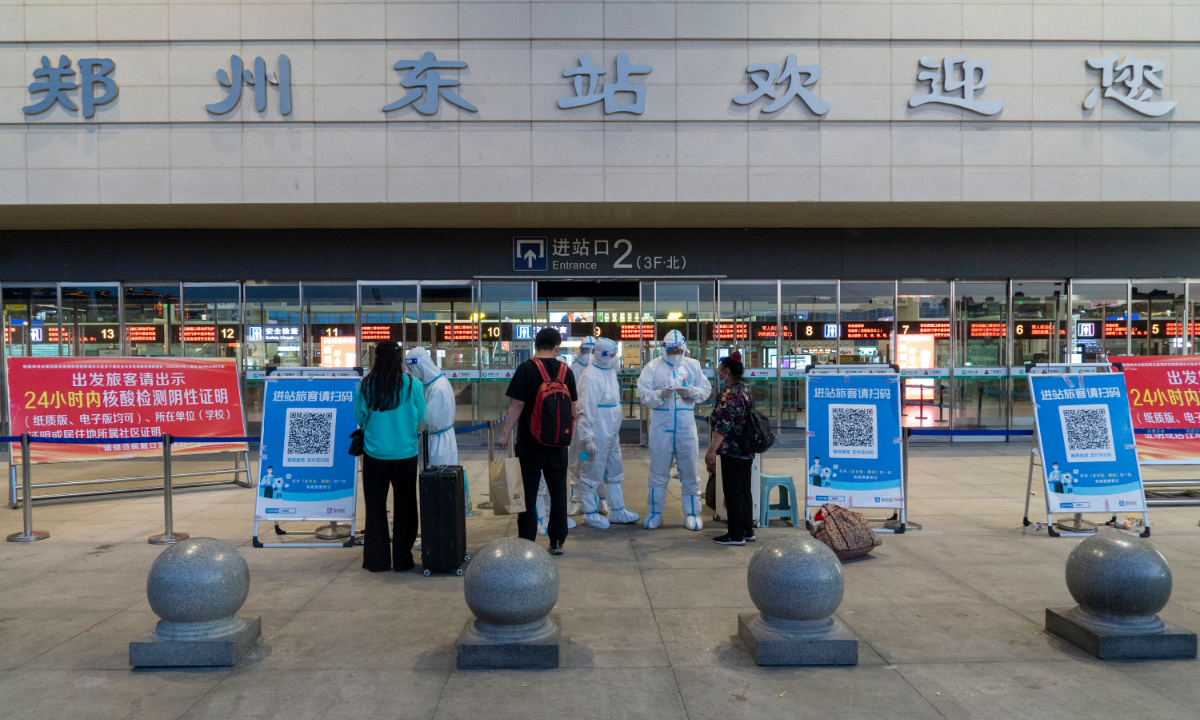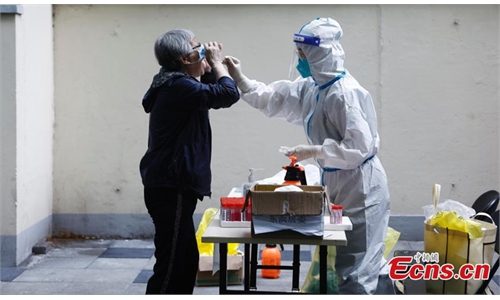
Staff check passengers' health codes and nucleic acid test results at a railway station in Zhengzhou, Central China's Henan Province, on May 4. Photo: VCG
The local commission for discipline inspection and supervision in Zhengzhou, Central China's Henan Province announced on Friday that it has started an investigation into reports and complaints about "health codes turning red."
Any violation of the health code system for COVID-19 prevention and control will be seriously punished in accordance with the regulations, said the commission.
We will "take a responsible attitude toward the people," find out the facts and clarify the responsibilities as soon as possible; we will order the relevant departments to correct mistakes and "respond to social concerns with concrete actions," said an official from the local commission for discipline inspection and supervision in Zhengzhou.
The epidemic prevention and control office in Henan province stressed that all levels of departments should strictly enforce management measures over health code and related rules, according to the CPC Central Commission for Discipline Inspection and the National Supervisory Commission on Friday.
The health code is only to be used for epidemic prevention and control, and it is forbidden to use it in any other way. Changes to the health code risk database must be in accordance with the rules, the authorities said.
The provincial epidemic prevention and control office again required all regions to strengthen health code management, and there will be serious consequences for improper use of the health code.
The Provincial Commission for Discipline Inspection and Supervision in Henan said on Thursday that it received numerous reports and complaints about "health codes turning red" and has forwarded the evidence to the Health Commission of Henan Province for further investigation.
Some local officials in Henan Province alleged that they were unaware of the situation, while others could not be reached by phone when asked about the issues with the health code system, according to media reports.
Some depositors of small rural banks, registered in Central China's Henan Province and reportedly caught in illegal fundraising, found their health codes turned red for unknown reasons when they tried to arrive in Henan to withdraw their money, prompting suspicions of abuse of the health code system in the province.
As of Tuesday afternoon, some of the red codes have returned green automatically, and Henan authorities said errors in the database may be the reason of the glitch.
Red health codes are usually granted to confirmed COVID-19 patients, close contacts, people tested positive and those who have high infection risks amid the epidemic prevention efforts. Those with a red code are usually brought to collective quarantine.
Bank client Wang Yun (pseudonym) found her health code red upon arriving in Zhengzhou, capital of Henan Province, even though she held a negative nucleic acid test report taken within 48 hours, Yicai, a financial news outlet affiliated with China Business Network, reported Tuesday.
After the four Henan rural banks were reported to have been caught in illegal fundraising scandals, their online service of money withdrawal was suspended and clients could only go to the banks' offices in Henan to withdraw their money, media reported.
Another bank client surnamed Deng lives in Shijiazhuang in North China's Hebei Province and has not been to Henan in the past 14 days. He is in a chat group formed by fellow depositors. Deng's health code turned red after he scanned a QR code for "Zhengzhou station west exit" which was shared in the chat group.
Another depositor reached by the Global Times via Sina Weibo said her code turned red too after scanning the QR code on Monday afternoon even if she did not leave her home in Luohe, Henan. The depositor had deposited some 100,000 yuan ($14,870) in a rural bank in Zhengzhou.
Henan Health Commission told media on Tuesday that it had received relevant complaints since Monday and reported the situation to relevant authorities.
Most of the cases occurred on Monday, the day when some depositors planned to gather in Zhengzhou to urge for the withdrawal of their money.
Snapshots of red health codes also included those of people who are in Beijing, East China's Shandong and Central China's Hunan provinces.
As of press time, some depositors in Zhengzhou found their health codes returned green before taking nucleic acid tests. Among people who returned to their hometowns from Zhengzhou, some people's codes turned back to green while some remained red.
It is unclear whether the "codes turning red" only occur among depositors, but it is believed to be errors in the database, media cited Henan local staff as saying.
The Global Times was informed by Zhengzhou city hotline 12345 that the red code was not granted at the city level and the city cannot handle the situation. The hotline has received multiple inquiries as of Tuesday afternoon and reported the situation to senior authority.
An "upgraded" version of the health code system has been implemented in Henan Province, local media reported on June 14, noting that the system was developed under the guidance of the provincial authorities, with technical support from a local technology company.
The provincial Administrative Approval and Government Affairs Information Bureau mentioned it is not aware of all the details about the issues with the health codes. Although it is mainly responsible for data aggregation, storage and processing, it has no right to decide the specific policy to assign health codes, a staff member told media.
The deposit crisis emerged in mid-April when depositors of four rural banks in Henan, many living outside Henan, panicked after finding they cannot withdraw their money online. Local depositors could still withdraw money via offline services. On May 18, China Banking and Insurance Regulatory Commission (CBIRC) responded it had noticed the situation and ordered the local banking regulator and the local branch of the People's Bank of China to solve the issue.
The CBIRC said a Henan-based corporation, which is shareholder of the four rural banks, used brokers and third-party platforms to illegally absorb public funds online and was under police investigation. The case involved funds of about 1.2 billion yuan ($179 million), per media reports.
Given the banking case's background, the latest "red health code" was seen by some in the public as a way to obstruct depositors from gathering in Zhengzhou to withdraw their money. The depositors suspect whether the system has been misused by the local department.


